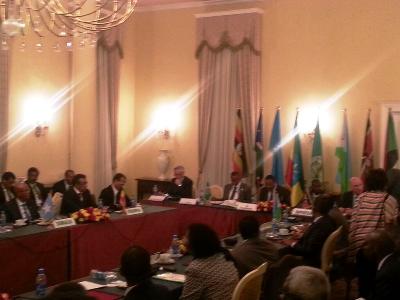IGAD summit delayed until Monday over controversial S. Sudan peace plan
August 24, 2014 (ADDIS ABABA) – The leaders of African regional bloc, the Intergovernmental Authority on Development (IGAD), have postponed a summit scheduled for Sunday until Monday after South Sudan’s warring parties contested a peace plan proposed by the mediation team.

The regional body, which is tasked with mediating the peace process between the South Sudanese government and Machar’s SPLM in Opposition faction, also postponed the heads of state summit which was due to kick off on Sunday.
The decision was taken after Ethiopian prime minister and chair of the IGAD bloc Hailemariam Desalegn held consultation meetings with the different head of states and delegations who are already in the capital, Addis Ababa, for the summit.
Both Kiir and Machar will attend the summit on Monday, which will bring together heads of state and government from across the region.
Sources at the talks say the controversial proposal calls for an interim government headed by Kiir as president with two deputies and a prime minister position for Riek Machar, also with two deputies.
Another alternative in the draft agreement provides that Kiir remain president, with Machar to be reinstated as vice-president, on the condition that both refrain from running for the presidency in the upcoming elections.
Kiir and Machar have both rejected the clauses, as well as the threat of tough sanctions, which are supported by the UN Security Council (UNSC), should they fail to accept the proposed peace plan.
Observers said the leaders’ rejection of the IGAD imposed proposal throw into question the regional body’s ability to mediate in the ongoing conflict.
Rebels earlier demanded that Kiir step aside, accusing him of inciting the violence and overseeing the massacre of thousands of ethnic Nuers who elected him to office, saying he was no longer a legitimate president.
Machar and his group argue that a mere power-sharing agreement imposed on the two parties by IGAD without addressing the root causes of the conflict is meaningless and would unravel in a short time, plunging the country back into another crisis.
Kiir on the other hand said he would remain the president, arguing that he was elected by the people.
The South Sudanese president has only provided for a second vice-president position to accommodate Machar until the next elections.
Meanwhile, international pressure, particularly from the US, is mounting on the two warring parties and IGAD to bring the conflict to a speedy end, amid growing mistrust among the rival South Sudanese leaders.
Tens of thousands of people have been killed while 1.5 million have been displaced internally and to neighbouring countries since conflict erupted in mid-December last year following a political dispute in South Sudan’s ruling party.
(ST)
